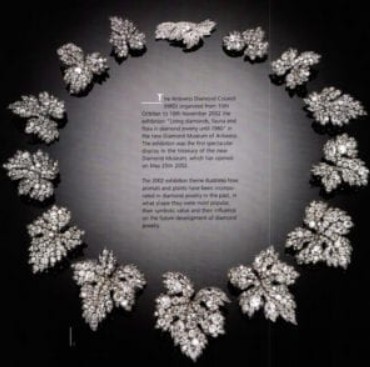Living Diamonds Fauna and Flora
1 Minute Read
The Antwerp Diamond Council (HRD) organized from 10th October to 10th November 2002 the exhibition "Living diamonds, fauna and flora in diamond jewelry until 1960" in the new Diamond Museum of Antwerp. The exhibition was the first spectacular display in the treasury of the new Diamond Museum, which has opened on May 25th 2002.
The 2002 exhibition theme illustrates how animals and plants have been incorporated in diamond jewelry in the past, in what shape they were most popular, their symbolic value and their influence on the future development of diamond jewelry.
Symbolism
Animals and plants have been part of mankind's artistic repertoire ever since prehistoric man drew simple, yet amazingly realistic images of horses, bison and mammoths on cave walls. Since then, animals worn by men are seen in all cultures and in every stratum of society. These "living" adornments had a typical symbolic value. ln ancient times animals were rendered naturalistical ly for amulet(ic) purposes. Later on these animal features became more abstract. During the Renaissance animal representations still had an allegorical significance. Roses and lilies, but also a dog, lion or eagle are frequently represented in coat of arms and orders of knighthood. Some of these orders such as the Habsburger Order of the Golden Fleece - with the skin of a buck - or the French order of the Holy Spirit - with the dove - only belong to the highest rank of nobility.
by Diamond Museum of Antwerp
You assume all responsibility and risk for the use of the safety resources available on or through this web page. The International Gem Society LLC does not assume any liability for the materials, information and opinions provided on, or available through, this web page. No advice or information provided by this website shall create any warranty. Reliance on such advice, information or the content of this web page is solely at your own risk, including without limitation any safety guidelines, resources or precautions, or any other information related to safety that may be available on or through this web page. The International Gem Society LLC disclaims any liability for injury, death or damages resulting from the use thereof.
The All-In-One Jewelry Making Solution At Your Fingertips
When you join the Ganoksin community, you get the tools you need to take your work to the next level.
Trusted Jewelry Making Information & Techniques
Sign up to receive the latest articles, techniques, and inspirations with our free newsletter.
